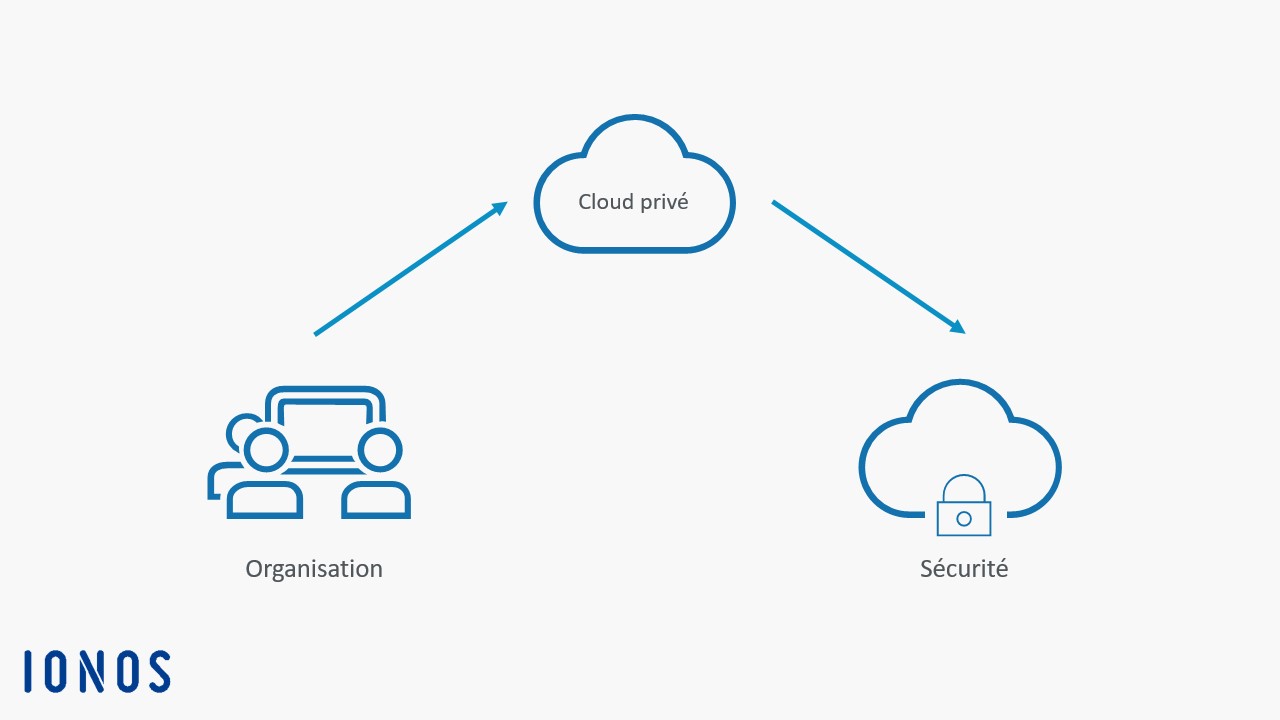A private cloud provides cloud computing services to authorized users via the Internet or an internal network. Unlike the public cloud, resources are neither public nor shared, but dedicated; This allows a higher level of security and control. Companies thus benefit from advantages such as scalability and flexibility and can use their private cloud directly on site or in a data center, according to their needs.
The technical base of the private cloud is virtualization. THE modern virtualization strategies make it possible to dissociate the services and IT resources from physical devices. Applications can be hosted virtually in a cloud, without having to be executed locally.
Private cloud is an optimal solution for companies that must comply with strict security and data processing regulations. Compared to the public cloud, the private cloud offers not only a significantly higher level of security and control, but it is also characterized by use more flexiblebecause the services are dimensioned according to the individual needs of the company, which often results in better operational efficiency.
Authorized users can access the application of private cloud via the company intranet or via a virtual private network (VPN). To do this, users generally have the rights necessary toauthenticate to cloud services. As a rule, external access to a private cloud is secured by a firewall, which secures individual computers or the entire network against unauthorized access.


Who is a private cloud for?
A private cloud is particularly suitable for businesses and organizations with high requirements in terms of data, security and control protection of their computer infrastructure. Private cloud is often the privileged solution, especially in regulated sectors such as finance and health, where sensitive data is processed.
Large companies and groups also turn to this model to provide tailor -made IT resources that can be flexibly adapted to their internal needs. THE companies with complex compliance requirementsfor example in terms of GDPR or regulations specific to their sector of activity, can then design their IT environment with personalized security policies.
Private cloud is also a powerful and scalable solution for companies that need a high availability and reliable performance For critical applications.
Compute Engine
The ideal IAAS solution to manage your workloads
- VCPU with advantageous costs and efficient dedicated hearts
- Without commitment for more flexibility
- Assistance by experts 24/7 included
Different types of private cloud
There are several forms of deployment of the private cloud, depending on the desired level of control and available resources:
- Internal private cloud : All IT infrastructure is within the company, operation, maintenance and management being provided by its IT department. This allows full control of infrastructure and data flows.
- Private Cloud Managed : the computer infrastructure for the cloud is hosted internally, but managed by an external supplier. Companies can thus benefit from flexibility and personalization of the private cloud, whose functions are adapted to the needs of the customer by the supplier. This increases efficiency and businesses always have a reliable contact for all questions relating to the cloud.
- Private Cloud Hosted : The private accommodated cloud is located in the external data center of a cloud service provider. This supplier manages the cloud on behalf of the company concerned and puts the corresponding applications at the disposal of users. This avoids having to buy your own equipment, but the security and reliability of the supplier are essential.
- Community private cloud : Several organizations, often in the same sector, share a private cloud infrastructure with coordinated compliance policies. This makes it possible to effectively share costs and resources while maintaining a high degree of exclusivity within the group. However, the harmonization of common standards and policies requires close collaboration between stakeholders.
The implementation of a private cloud requires a technical expertise in -depth and often costs a lot of time and ofmoney to companies. All these elements are limited in most small and medium -sized enterprises, which can make the creation of a private cloud a real challenge. In such cases, the managed or accommodated private cloud is the most advantageous choice.
Advantages of a private cloud
By opting for a private cloud, companies not only benefit from increased control over their IT infrastructure, but also many functional and economic advantages. While traditional IT structures are often associated with high maintenance costs and limited scalability, the private cloud makes it possible to have a Flexible, efficient and secure solution. This model is particularly attractive for companies with high data protection, performance and personalization requirements. Here is an overview of the main advantages:
- Personalization : Cloud applications are personalized according to the individual needs of the company.
- Infrastructure capacities : Increased infrastructure capacity for significant calculation and storage needs.
- More security : Security risks are minimized thanks to the separate exploitation of the private cloud.
- Cloud features : Users have exclusive access to the performance and bandwidth of the cloud. They are therefore not affected by third -party uses, which guarantees constant quality of service.
Advice
Benefit from increased security thanks to the dedicated equipment and the physical infrastructure that you use exclusively with the Private cloud from Ionos. The payment model for use is done via invoicing per minute, for maximum freedom.
Other cloud models
In addition to the private cloud, there are other established cloud models which differ according to needs and use:
- Cloud Public : In a public cloud, suppliers like AWS, Microsoft Azure or Google Cloud make IT resources available to a large user basis via the Internet. Companies pay only for the capabilities actually used (Pay as you go), which makes this model particularly profitable. The ease of evolution and the low administrative load make the public cloud the ideal solution for companies whose resource needs vary.
- Hybrid cloud : the hybrid cloud combines private and public clouds, which allows companies to keep critical and sensitive data in a private cloud while processing less sensitive workloads in the public cloud. This allows great flexibility and cost savings, since IT resources can be distributed optimally. Companies with compliance requirements particularly benefit from this model.
- Multi-Cloud : In a multi-cloud strategy, companies use several parallel cloud suppliers to optimally combine different services or to ensure redundancy and resilience. For example, a company can use AWS for web hosting, Google Cloud for analysis tools and a third supplier for backup. This strategy makes it possible in particular to reduce dependence on a single supplier and makes it possible to target the best cloud services for different areas of application. The distributed use thus optimizes performance and costs according to needs.
Startup Ionos Program
The cloud that evolves to the rhythm of your startup
- Voucher worth € 5,000
- Personalized assistance by experts
- RGPD services




